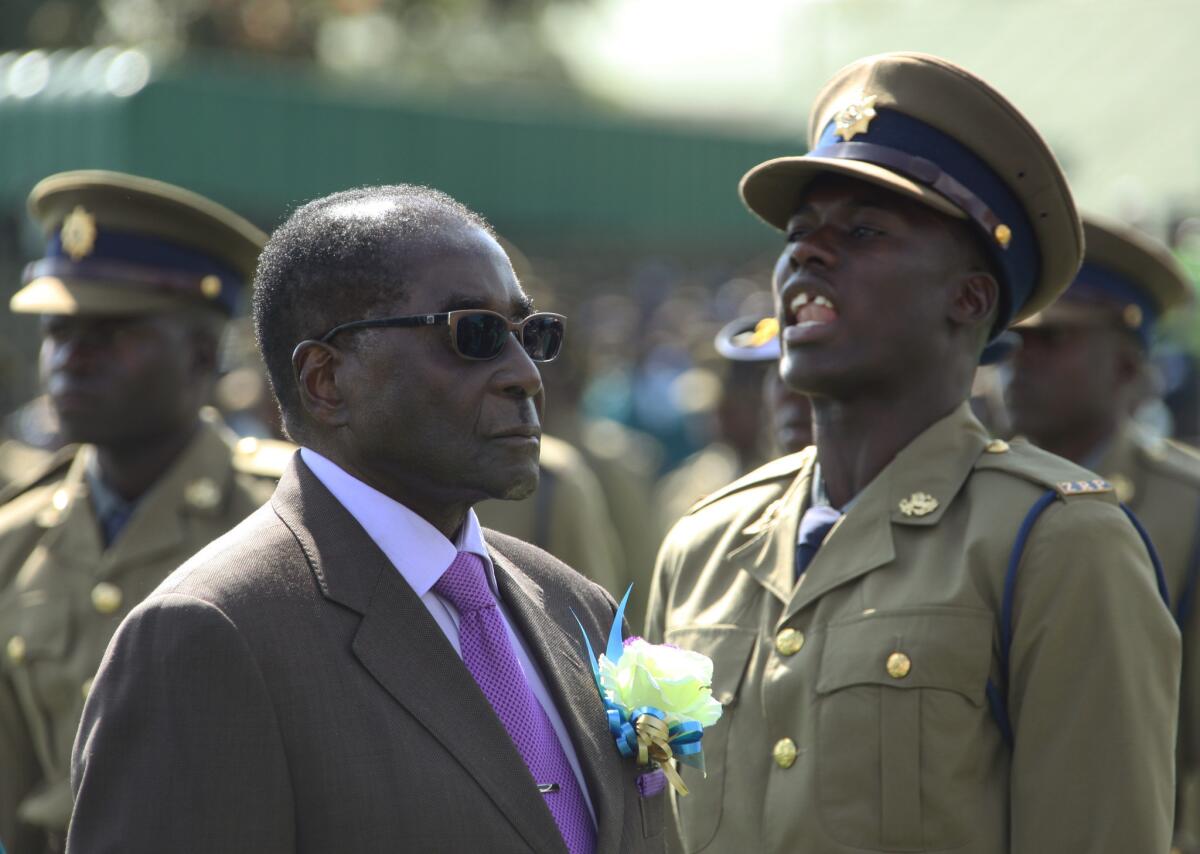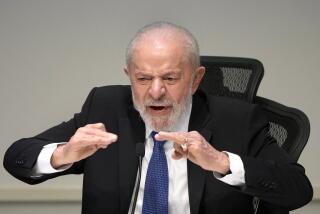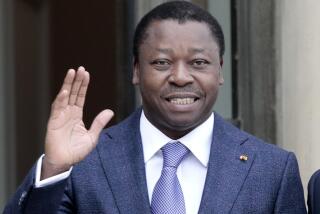Zimbabwe’s Mugabe calls election but his rival rejects the date

- Share via
JOHANNESBURG, South Africa -- Five years after bitterly disputed elections, Zimbabwe faced a new political conflict Thursday as President Robert Mugabe called elections for July 31 and his rival swiftly rejected the date.
The rival, Prime Minister Morgan Tsvangirai, told journalists he would not let Zimbabwe be rushed into “another illegitimate election.”
Mugabe issued a presidential decree Thursday setting the date, ignoring the opposition of Tsvangirai’s Movement for Democratic Change, which says it would be impossible to hold free and fair elections by then.
Mugabe and Tsvangirai have been partners for four years in an uneasy government of national unity under a power-sharing deal brokered by neighboring countries to resolve the deadlock after last elections.
Both sides claimed victory in the 2008 poll, which was marked by intense political violence by Mugabe supporters who set up camps around the country to beat up MDC members and intimidate voters into backing Mugabe’s ruling ZANU-PF party.
Tsvangirai said Thursday in Harare, the capital, that the date for the next election must be jointly decided between him and Mugabe.
“You can’t set a date of an election without my concurrence. Period. I will not give legitimacy to that election date unless we agree,” Tsvangirai told journalists. He said the election should be delayed until late August, at the earliest.
With Mugabe still firmly in control of the military, whose chiefs have vowed never to serve Tsvangirai, the MDC is calling for reforms to electoral procedures and measures to ensure the security sector will not sway the election before voting goes ahead. It is pressing for measures to ensure the electoral commission is impartial and to liberalize the media.
Mugabe’s move to set an election date follows an order by the Constitutional Court that elections must be held no later than July 31. The courts in Zimbabwe, stacked with Mugabe appointees, have long been seen as favoring the ruling party.
The opposition can still challenge the election date before the Constitutional Court.
The Zimbabwean president’s move leaves in an awkward position the regional Southern African Development Community, which may find it difficult to influence the election’s timing now that Mugabe has publicly announced the date and linked it to the court decision. The group postponed a summit on Zimbabwe last weekend and is due to meet on the issue this weekend in Mozambique.
The SADC is expected to help raise funds for the election to go ahead. Without adequate funding, the fairness of the polls could be further compromised.
Tsvangirai has urged the regional group to establish an elections road map, including what steps must be taken in the lead-up to a poll to ensure free and fair conditions. He has hinted he may boycott balloting unless the MDC’s conditions are met.
Mugabe has alienated South African leaders with his provocative criticism of their nation’s beloved former president, Nelson Mandela, which were aired on South African television in recent weeks. He said Mandela was “too saintly” and had been soft on whites, comments that came shortly before Mandela was rushed to hospital Saturday suffering from a lung infection.
The Zimbabwean unity government has staggered along since the last vote, delivering some improvement in people’s lives. The MDC, which is divided into two factions with different leaders, controls the Finance Ministry and portfolios associated with service delivery such as health and education. Mugabe retains control of the military, intelligence and security sectors, seen by analysts as the key to determining whether the election is legitimate.
Human Rights Watch last week accused Mugabe’s security forces of unleashing a new reign of fear across the country to intimidate voters into supporting ZANU-PF.
“The security forces have a long history of partisanship on behalf of President Robert Mugabe and the Zimbabwe African National Union–Patriotic Front (ZANU-PF), one of the parties in the current unity government and the former ruling party,” the report said. “Since independence in 1980, the army, police and CIO (Central Intelligence Organization) have operated within a system that has allowed elements within their ranks to arrest, torture and kill perceived opponents with impunity.”
The report said that the army had once more deployed soldiers around the country, beating, intimidating and abusing Zimbabweans, especially those with links to the MDC.
“As things stand, the chances of having free, fair and credible elections are slim, particularly given the shortcomings of security sector reforms and reforms in other sectors,” the report said.
ALSO:
Istanbul protesters fear what a new day will bring
Decades after a Mexican kingpin’s arrest, his fortune echoes
Chinese state media chide U.S. over Edward Snowden’s allegations
More to Read
Sign up for Essential California
The most important California stories and recommendations in your inbox every morning.
You may occasionally receive promotional content from the Los Angeles Times.










